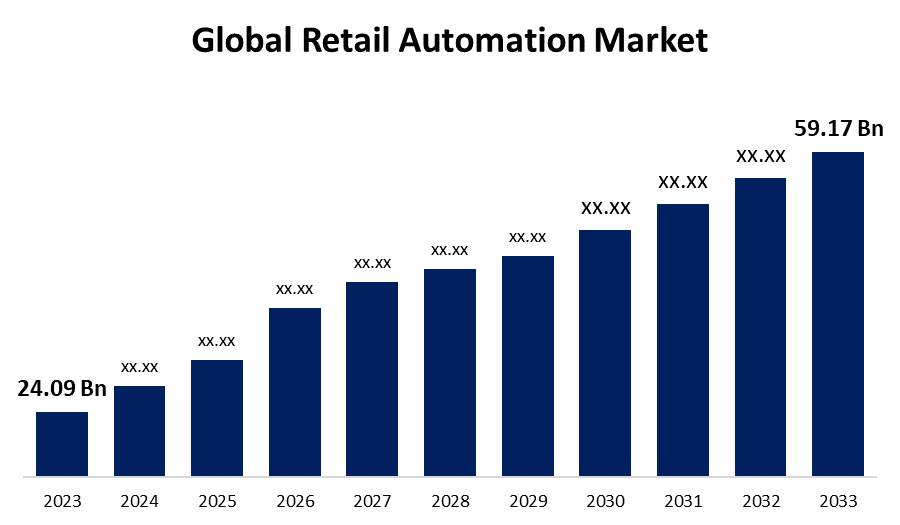Global Retail Automation Market Size, Share, and COVID-19 Impact Analysis, By Product (Point-of-Sale (POS), RFID & Barcode, Camera, Electronic Shelf Label, Warehouse Robotics, and Others), By Implementation (In-store and Warehouse), By End-use (Hypermarkets, Single Item Stores, Supermarkets, Fuel Stations, Retail Pharmacies, and Others), and By Region (North America, Europe, Asia-Pacific, Latin America, Middle East, and Africa), Analysis and Forecast 2023 - 2033
Industry: Semiconductors & ElectronicsGlobal Retail Automation Market Insights Forecasts to 2033
- The Global Retail Automation Market Size was estimated at USD 24.09 Billion in 2023
- The Market Size is Expected to Grow at a CAGR of around 9.4% from 2023 to 2033
- The Worldwide Retail Automation Market Size is Expected to Reach USD 59.17 Billion by 2033
- Asia Pacific is expected to grow the fastest during the forecast period.

Get more details on this report -
The Global Retail Automation Market size was worth around USD 24.09 Billion in 2023 and is predicted to grow to around USD 59.17 Billion by 2033 with a compound annual growth rate (CAGR) of 9.4% between 2023 and 2033. Increasing adoption of robotics automation across the retail industry is expected to drive market growth.
Market Overview
The global retail automation market refers to the use of technology to automate various retail operations, such as inventory management, point-of-sale transactions, customer service, and supply chain processes. This market includes hardware and software solutions like self-checkout systems, electronic shelf labels, and automated guided vehicles. Retail automation is the process of streamlining several processes including inventory management and customer service by utilizing hardware and software solutions, such as self-service kiosks, automated checkout systems, and AI-powered analytics. Retailers are using this technology to improve consumer experiences, increase operational efficiency, and save labor costs. The market is primarily driven by the expansion of e-commerce, the demand for cost-effective operations, and growing customer expectations for quicker, more individualized services. As retailers look for creative ways to stay competitive and satisfy the needs of contemporary consumers, the retail automation market is expected to grow significantly.
Report Coverage
This research report categorizes the global retail automation market based on various segments and regions forecasts revenue growth and analyzes trends in each submarket. The report analyses the key growth drivers, opportunities, and challenges influencing the global retail automation market. Recent market developments and competitive strategies such as expansion, type launch, development, partnership, merger, and acquisition have been included to draw the competitive landscape in the market. The report strategically identifies and profiles the key market players and analyses their core competencies in each sub-segment of the global retail automation market.
Global Retail Automation Market Report Coverage
| Report Coverage | Details |
|---|---|
| Base Year: | 2023 |
| Market Size in 2023: | USD 24.09 Billion |
| Forecast Period: | 2023 – 2033 |
| Forecast Period CAGR 2023 – 2033 : | CAGR of 9.4% |
| 023 – 2033 Value Projection: | USD 59.17 Billion |
| Historical Data for: | 2019-2022 |
| No. of Pages: | 242 |
| Tables, Charts & Figures: | 120 |
| Segments covered: | By Product, By Implementation, By End-use and By Region |
| Companies covered:: | 6 River Systems LLC Casio Computer Co. Ltd. Amazon Web Services, Inc. Datalogic S.p.A. E&K Automation GmbH Honeywell Scanning and Mobility Diebold Nixdorf, Incorporated. ECR Software Corporation NCR Corporation Kiosk & Display LLC Kuka AG Pricer AB Toshiba Global Commerce Solutions Inc. Wincor Nixdorf AG Zebra Technologies Corporation And Others |
| Pitfalls & Challenges: | COVID-19 Empact,Challenges, Future, Growth, & Analysis |
Get more details on this report -
Driving Factors
The market is expanding due to the need for retail operational workflows to be streamlined to enhance business procedures, supply chain visibility and transparency, and organizational efficiency over the long term. The Internet of Things (IoT) and machine learning (ML), two automation technologies that are anticipated to support market expansion, are also integrated into retail automation software, which offers end-to-end visibility and removes redundancies.
Restraining Factors
The technological complexity resulting from sophisticated automation techniques requires considerable investments, transformation projects, and long payback periods, which are expected to considerably impede the growth of the global retail automation market.
Market Segmentation
The global retail automation market share is classified into product, implementation, and end-use.
- The point-of-sale segment accounted for the largest share in 2023 and is projected to grow at a remarkable CAGR during the forecast period.
In the terms of product, the global retail automation market is divided into point-of-sale (POS), RFID & barcode, camera, electronic shelf label, warehouse robotics, and others. Among these, the point-of-sale segment accounted for the largest share in 2023 and is projected to grow at a remarkable CAGR during the forecast period. A surge in the use of the Internet of Things (IoT), application programming interfaces (API), robotics process automation, and merchandise optimisation are the main drivers of this segment's growth.
- The in-store segment accounted for the highest share in 2023 and is anticipated to grow at a significant CAGR during the forecast period.
In the terms of implementation, the global retail automation market is divided into in-store and warehouse. Among these, the in-store segment accounted for the highest share in 2023 and is anticipated to grow at a significant CAGR during the forecast period. The increasing focus on omnichannel shopping, advancements in robotics and artificial intelligence, and the growing demand for contactless and self-service technologies are some of the factors contributing to the segment's rise. Additionally, by automating retail locations and leveraging cloud-based technologies, operators enable reduced maintenance costs associated with routine inspections.
- The supermarket electronics segment accounted for the highest share in 2023 and is anticipated to grow at a substantial CAGR during the forecast period.
In the terms of end-use, the global retail automation market is divided into hypermarkets, single item stores, supermarkets, fuel stations, retail pharmacies, and others. Among these, the supermarket electronics segment accounted for the highest share in 2023 and is anticipated to grow at a substantial CAGR during the forecast period. Retail automation is being used by supermarkets more and more to improve customer pleasure, reduce waste, shorten shopping trips, and save money. These improvements lead to better customer experiences and more repeat business. Additionally, the market in emerging economies has potential to expand.
Regional Segment Analysis of the Global Retail Automation Market
- North America (U.S., Canada, Mexico)
- Europe (Germany, France, U.K., Italy, Spain, Rest of Europe)
- Asia-Pacific (China, Japan, India, Rest of APAC)
- South America (Brazil and the Rest of South America)
- The Middle East and Africa (UAE, South Africa, Rest of MEA)
North America is anticipated to hold the largest share of the global retail automation market over the predicted timeframe.

Get more details on this report -
North America is anticipated to hold the largest share of the global retail automation market over the predicted timeframe. North American merchants are expanding their research and development efforts worldwide. Furthermore, to meet the demands of international trade, new technologies in the retail sector are anticipated to expand throughout North America. Moreover, the main factors anticipated to drive the expansion of retail automation in the area are the rising demand for extremely complex retail services and the requirement to attain high levels of accuracy in retailing activities like inventory management.
Asia Pacific is expected to grow at the fastest CAGR in the global retail automation market during the forecast period. Globally, the industrial internet of things and increased connectivity are extending significant opportunities to understand new levels of productivity throughout the retail value chain. In terms of sophisticated applications, China's smart warehouse development has shown notable expansion. China is one of the biggest users of industrial robots, because of rising demand.
Competitive Analysis:
The report offers the appropriate analysis of the key organizations/companies involved within the global retail automation market along with a comparative evaluation primarily based on their type of offering, business overviews, geographic presence, enterprise strategies, segment market share, and SWOT analysis. The report also provides an elaborative analysis focusing on the current news and developments of the companies, which includes type development, innovations, joint ventures, partnerships, mergers & acquisitions, strategic alliances, and others. This allows for the evaluation of the overall competition within the market.
List of Key Companies
- 6 River Systems LLC
- Casio Computer Co. Ltd.
- Amazon Web Services, Inc.
- Datalogic S.p.A.
- E&K Automation GmbH
- Honeywell Scanning and Mobility
- Diebold Nixdorf, Incorporated.
- ECR Software Corporation
- NCR Corporation
- Kiosk & Display LLC
- Kuka AG
- Pricer AB
- Toshiba Global Commerce Solutions Inc.
- Wincor Nixdorf AG
- Zebra Technologies Corporation
Key Target Audience
- Market Players
- Investors
- End-users
- Government Authorities
- Consulting And Research Firm
- Venture capitalists
- Value-Added Resellers (VARs)
Recent Development
- In November 2023, Brain Corporation and Dane Technologies expanded their partnership, to develop inventory-scanning systems for retailers using Brain Corporation's robotics platform.
Market Segment
This study forecasts revenue at global, regional, and country levels from 2023 to 2033. Spherical Insights has segmented the global retail automation market based on the below-mentioned segments:
Global Retail Automation Market, By Product
- Point-of-Sale (POS)
- RFID & Barcode
- Camera
- Electronic Shelf Label
- Warehouse Robotics
- Others
Global Retail Automation Market, By Implementation
- In-store
- Warehouse
Global Retail Automation Market, By End-use
- Hypermarkets
- Single Item Stores
- Supermarkets
- Fuel Stations
- Retail Pharmacies
- Others
Global Retail Automation Market, By Regional Analysis
- North America
- US
- Canada
- Mexico
- Europe
- Germany
- UK
- France
- Italy
- Spain
- Russia
- Rest of Europe
- Asia Pacific
- China
- Japan
- India
- South Korea
- Australia
- Rest of Asia Pacific
- South America
- Brazil
- Argentina
- Rest of South America
- Middle East & Africa
- UAE
- Saudi Arabia
- Qatar
- South Africa
- Rest of the Middle East & Africa
Frequently Asked Questions (FAQ)
-
1. What are the factors driving the retail automation market?The market is expanding due to the need for retail operational workflows to be streamlined to enhance business procedures, supply chain visibility and transparency, and organizational efficiency over the long term.
-
2. Who are the key players in retail automation market?6 River Systems LLC, Casio Computer Co. Ltd., Amazon Web Services, Inc., Datalogic S.p.A., E&K Automation GmbH, Honeywell Scanning and Mobility, Diebold Nixdorf, Incorporated., ECR Software Corporation, NCR Corporation, Kiosk & Display LLC, Kuka AG, Pricer AB, Toshiba Global Commerce Solutions Inc., Wincor Nixdorf AG, Zebra Technologies Corporation, and Others.
-
3. How big is the retail automation market?The global retail automation market size is expected to grow from USD 24.09 billion in 2023 to USD 59.17 billion by 2033, at a CAGR of 9.4% during the forecast period 2023-2033.
Need help to buy this report?